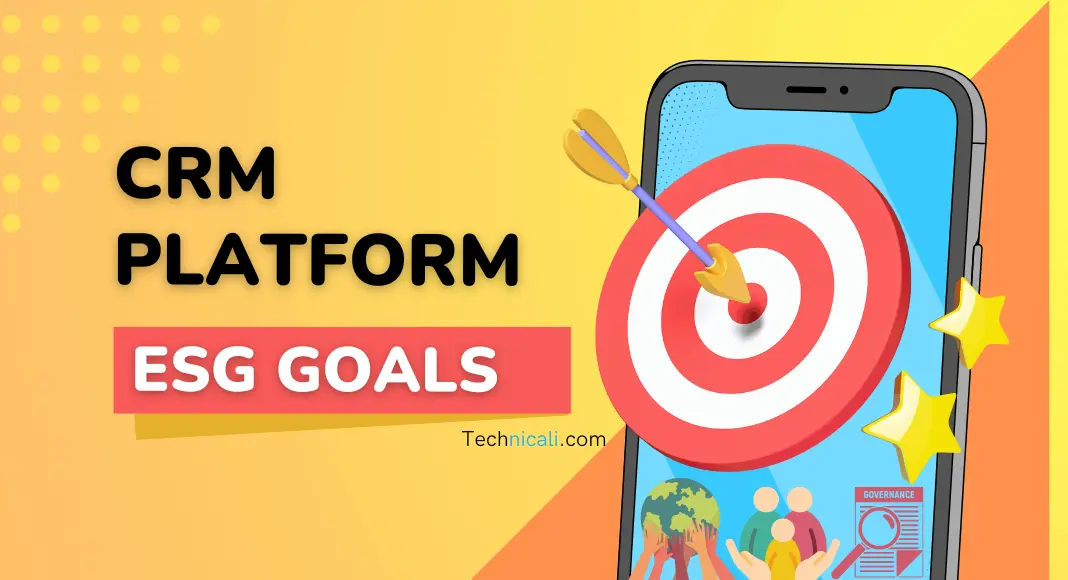In the ever-evolving world of Customer Relationship Management (CRM), integrating Environmental, Social, and Governance (ESG) goals is not just some trend. No, it’s an absolute must-have. So, let’s deeply dive into how CRM, the ultimate tool for customer engagement and retention, collides with ESG goals. This glorious union drives sustainable and responsible business practices in the SaaS industry.
This guide is like a shining beacon for you SaaS business executives. It’s gonna take you on a wild ride through the ins and outs of ESG integration with CRM platforms. You’ll be armed with all the necessary information to make those informed decisions and steer your organization toward growth, sustainability, and ethical excellence. Trust me, you’ll be the SaaS superstar your team needs.
Contents
What is ESG?
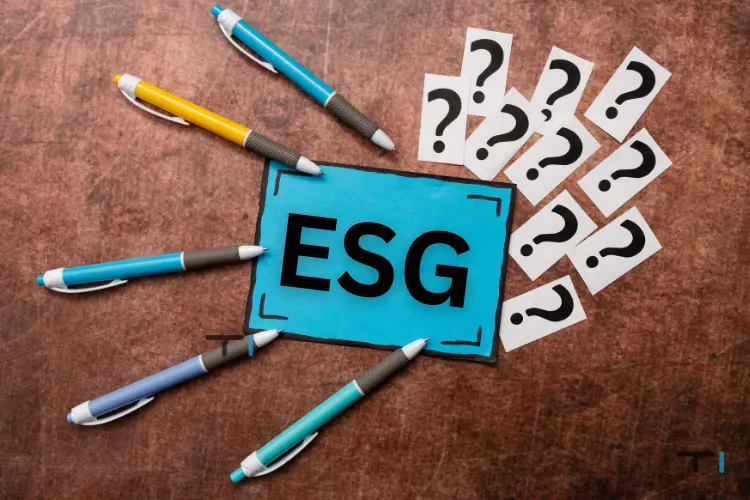
ESG, which stands for Environmental, Social, and Governance, is the trio of corporate behavior and decision-making. These three pillars bring a refreshing change to the business world, focusing on sustainability and ethics rather than the same old metrics.
- Environmental: This pillar is about how a company impacts the natural environment. It’s about how they handle their ecological responsibilities and their approach to sustainability. So basically, it’s about being responsible and not wrecking the planet. We’re talking about reducing waste, conserving resources, and being mindful of our ecological footprint. It’s all about doing our part to protect this beautiful planet we call home. Key considerations include:
- Carbon Footprint: Measures the total greenhouse gas emissions caused directly or indirectly by a business because, you know, we all want to save the planet.
- Resource Management: It’s all about using resources wisely, like water and energy. We gotta conserve and be sustainable, you know? It’s the smart thing to do.
- Waste Management: This passage is about reducing waste and improving recycling efforts because, let’s face it, we could all be doing much better in that department. So, here are some strategies to help you out. Try to cut down on waste production. That means being mindful of what you’re using and throwing away. Recycling is the key. Ensure you recycle everything you can, from paper and plastic to glass and metal. Let’s do our part to make the world cleaner and greener!
- Environmental Policies: Developing and implementing policies that support environmental sustainability are important, and we’re talking about making a real difference here. It’s like standing and saying, “Hey, Mother Nature, we’ve got your back!” We need to be smart about this. Let’s make sure our policies are kicking butt and taking names when it comes to protecting our planet.
- Social: This aspect is about how the company interacts with its employees, suppliers, customers, and the communities where it operates. It’s like maintaining a good relationship with your family, friends, and neighbors – treating them well and showing them respect is important. After all, we’re all in this together, and when we work together, amazing things can happen. So, let’s build strong connections and positively impact the world! It covers:
- Employee Relations and Diversity: It’s all about fair labor practices, diversity and inclusion, and employee well-being. Because, you know, treating people right and making them feel valued? It’s the way to go!
- Community Engagement: Refers to a company’s involvement in community development and philanthropy, you know, doing good stuff for the world. It’s like when a company cares about more than just making money and decides to impact society positively.
- Customer Satisfaction: We’re all about product safety, quality, and fair business practices. It’s kind of our thing. We take this seriously, so you can trust us to deliver the goods.
- Human Rights: Ensure the business and its supply chain respect and promote human rights.
- Governance: This pillar covers all the fun stuff like leadership, executive pay, audits, internal controls, and shareholder rights. It includes:
- Corporate Governance Structure: The framework of rules, practices, and processes by which a company is directed and controlled. It’s like the guiding light, the secret sauce, the magical unicorn that keeps everything in check.
- Ethical Business Practices: It ensures transparency, ethics, and integrity in every business interaction. No funny business allowed!
- Compliance: Complying with laws, regulations, and standards, including financial reporting and disclosure.
By incorporating these ESG components, businesses can ensure they operate responsibly, promoting sustainability while balancing the interests of diverse stakeholders. This approach not only supports ethical practices but can also drive long-term profitability and resilience in a rapidly evolving global marketplace. Who doesn’t want to make money while saving the world, right? So, let’s be responsible and grow in the business world!
The Need for ESG in CRM

Integrating ESG (Environmental, Social, and Governance) principles into CRM (Customer Relationship Management) systems is like adding a spice to your business recipe. It’s becoming super important in the modern business landscape. So, let’s shake things up and make a positive impact! This necessity is rooted in several key factors:
- Enhancing Customer Relationships: Consumers are all about being environmentally and socially conscious. So, if businesses want to keep up with their expectations, they better start incorporating those ESG values into their CRM strategies. It’s all about building stronger relationships.
- Personalization: CRM systems are like the secret sauce that lets companies understand and respond to their customers’ ESG-related preferences. It’s all about offering those personalized experiences and solutions. Because who wants a generic, one-size-fits-all approach? Not us! With CRM systems, companies can get up close and personal with their customers.
- Risk Management: Incorporating ESG considerations into CRM is like having a secret weapon to spot and tackle risks associated with environmental and social issues. It helps businesses stay ahead of the game. It’s time to break free from the norms and make a difference!
- Market Opportunities: ESG-focused CRM strategies are like the cool kids on the block. They know how to uncover new market segments and opportunities, especially among those sustainability-savvy consumers. These people prioritize ethical practices and know that doing good can be good for business, too. So, if you want to stand out from the crowd and make a positive impact.
- Meeting Legal Standards: Many regions out there are getting all strict about ESG-related regulations. It’s like they want everything tracked and managed properly. That’s where CRM systems come in. They make sure you stay in line with those ever-changing legal requirements. Trust me, you don’t want to mess with that stuff. So, get yourself a CRM system that handles all those ESG metrics. It’s the smart move.
- Transparency and Reporting: CRM platforms can help collect and report ESG data, making it easy to communicate transparently with stakeholders and regulatory bodies. It’s like having your personal assistant cost efficiency but for all things ESG! So why settle for the old-school, manual way of doing things when you can have a CRM platform? It’s time to embrace the future and level up your ESG game!
- Resource Optimization: By leveraging ESG principles, CRM systems can work wonders for businesses in optimizing resource use. This leads to cost savings and helps reduce their environmental impact.
- Waste Reduction: CRM insights can work wonders for companies by helping them reduce waste in their operations and supply chain. Not only does this contribute to environmental stewardship, but it also adds a nice touch of cost efficiency. So, if you want to save the planet and your pocket, CRM insights are the way to go!
- Positive Public Perception: Companies seen as responsible and sustainable, like those that have their act together, tend to enjoy some serious brand loyalty and a stellar reputation. It’s like people just can’t get enough of them! So, if you want to be one of the cool kids in the business world, maybe it’s time to start thinking about what you can do to join the club.
- Employee Engagement: ESG-focused businesses have this amazing ability to attract and retain employees who are all about working for socially responsible companies. It’s like a magnet for motivated individuals who genuinely care about making a difference.
- Driving Innovation: The need to meet ESG goals can spark serious innovation within CRM solutions, resulting in new and exciting features and capabilities. Who knew that striving for sustainability could lead to such exciting advancements? It shows that innovation is bound to follow suit when we set our sights on making a positive impact. So, let’s embrace this opportunity to push the boundaries and reimagine what CRM solutions can achieve.
- Sustainable Growth: Incorporating ESG into CRM is aligned with the broader trend of sustainable business practices. It’s a no-brainer for long-term success in a changing global environment.
To sum it up, the need for ESG in CRM is driven by changing consumer expectations, regulatory landscapes, and the overarching shift toward sustainable and ethical business practices. By incorporating ESG principles into CRM strategies, companies can build customer relationships, boost operational efficiency, comply with regulatory standards, and contribute positively to their reputation and bottom line.
CRM SaaS ESG Initiatives
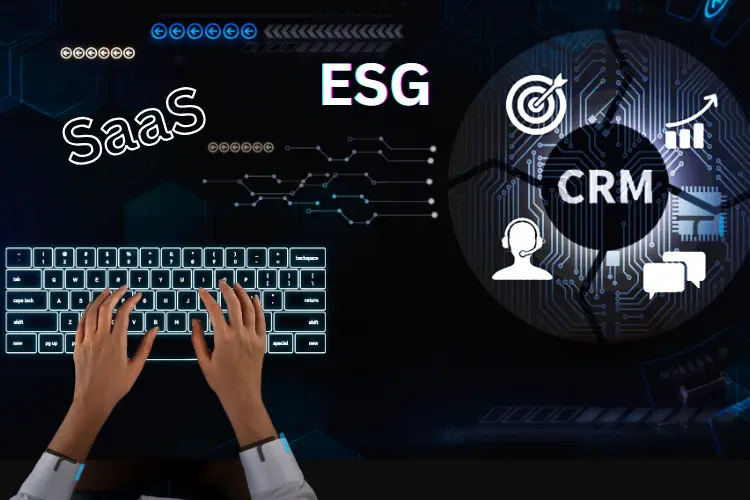
The SaaS CRM model presents some interesting opportunities and challenges regarding ESG initiatives. It’s like navigating a maze while juggling flaming torches – not an easy task, but worth the effort. Let’s dive in and find out!
Environmental Footprint of CRM SaaS
Regarding environmental stewardship, CRM SaaS providers are all about minimizing their ecological footprint. They’re on a mission to optimize data center efficiency and reduce energy consumption, which greatly contributes to those greenhouse gas emissions. How? Well, they’re using energy-efficient servers and tapping into renewable energy sources. Not only does this save them some serious dough, but it also shows their commitment to being eco-friendly. These CRM SaaS platforms even have features that let businesses track their green impact. They’re all about paperless transactions and digital interactions, encouraging everyone to get their eco-friendly groove.
Social and Governance Initiatives in CRM SaaS
Regarding the social and governance front, CRM SaaS companies are superheroes with ethical business practices and a commitment to corporate social responsibility. They protect customer data like it’s their secret identity and ensure it’s safe and secure. These companies also believe in the power of diversity and equality, making their workforce a league of extraordinary individuals. They follow the rules, play nice, and even comply with international standards and regulations.
Innovative Solutions for ESG Challenges
CRM SaaS platforms are rocking it on the innovation front when tackling ESG challenges. They’re going all out by integrating AI and machine learning algorithms to give businesses the lowdown on sustainable practices. Talk about data-driven decisions that align with ESG goals! They even offer cool features like automated ESG reporting, stakeholder engagement tools, and sustainability analytics. It’s like having your superhero sidekick to track and manage ESG performance. These technological advancements aren’t just boosting efficiency; they’re empowering businesses to take on global environmental and social challenges.
CRM SaaS providers are enhancing their product offerings and contributing to a more sustainable and socially responsible business ecosystem.
ESG Goals for CRM SaaS Platforms
Setting and achieving ESG goals is a multifaceted process for CRM SaaS platforms.
- Carbon Footprint Reduction: Discuss reducing carbon emissions from data centers and operations. We’re aiming for carbon neutrality or net-zero emissions. No small feat, but hey, we’re up for the challenge!
- Energy Efficiency Optimization: We need to crank up the energy efficiency in all our operations, especially those data centers. And how are we gonna do that? We will tap into renewable energy sources and get all innovative with our cooling technologies.
- Sustainable Resource Management: If you want to be cool and sustainable in managing your resources, adopt some eco-friendly practices. You know, using materials that won’t harm the planet and getting all into recycling stuff, especially those hardware and components.
- Data Privacy and Security: Make sure user data is protected with the highest privacy and security standards. We’re talking international regulations and best practices here, folks. No messing around when it comes to keeping your data safe.
- Diversity and Inclusion: Let’s foster a diverse and inclusive workforce, shall we? Because who needs boring and monotonous when you can have a vibrant mix of talents and backgrounds? Equal opportunities for all employees, irrespective of where they come from. Let’s break those barriers and make magic happen together!
- Community Engagement and Support: Engage with and support local communities, focusing on initiatives that promote education, technology access, and social welfare.
- Transparent and Ethical Governance: We need to maintain some seriously high standards of corporate governance. I’m talking transparency, ethical business practices, and, of course, following all those pesky laws and regulations. Trust me, it’s worth it in the long run.
- Customer-Centric Sustainable Solutions: Develop and offer CRM solutions that help clients achieve their sustainability goals. Think of features for tracking their environmental impact or social responsibility initiatives.
- Employee Well-being and Development: Make sure to prioritize employee well-being and professional development because, you know, it’s kind of important. We must ensure a healthy work-life balance and give them continuous learning opportunities.
- Innovation for Sustainable Impact: We gotta keep innovating not just for the sake of business efficiency but also for the planet and society. We need solutions that rock the boat and make a positive impact.
These goals represent a real comprehensive approach for CRM SaaS platforms to integrate Environmental, Social, and Governance (ESG) principles into their core operations and product offerings. It’s all about reflecting a commitment to sustainability and ethical practices in the tech industry. We’re shaking things up, breaking free from the old ways, and paving the way for a better future.
CRM System for ESG Compliance
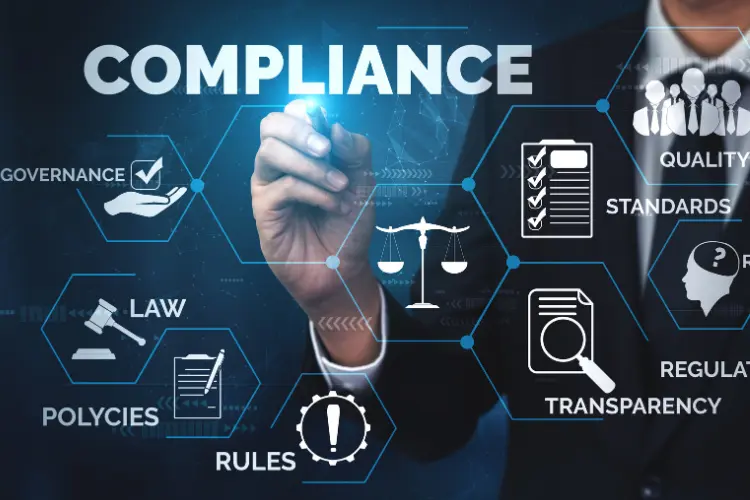
Ensuring compliance with ESG standards is a pretty big deal when it comes to CRM systems. I mean, seriously, a CRM (Customer Relationship Management) system that’s all about ESG (Environmental, Social, and Governance) compliance? It helps businesses meet all those ever-changing standards and expectations in these domains. This CRM system becomes the ultimate hub where all the data related to ESG initiatives is collected, managed, analyzed, and reported. It ensures companies can adhere to regulations while promoting sustainability and responsibility.
One of the coolest things about this CRM system for ESG compliance is data consolidation and reporting. It’s like gathering all the good stuff from different sources, like environmental impact assessments, social responsibility initiatives, and governance practices, and putting it all together. This makes creating those comprehensive ESG reports a piece of cake, which regulators and stakeholders crave nowadays. These CRM systems are all about automation, reducing the hassle of manual data compilation and the risk of human error. It’s like having a personal assistant who knows their stuff and frees up your time for more strategic ESG planning and execution. These systems can generate real-time ESG dashboards, giving you a quick overview of your progress toward those ESG goals. It’s like a GPS for your sustainability journey so you can make smart decisions and adjust your course when needed.
Overall, a CRM system built for ESG compliance keeps your business accountable, transparent, and responsive to all those ESG stakeholders. It’s like joining the league of superheroes, making the corporate landscape more sustainable and ethical. So, buckle up and get ready to conquer the ESG world!
ESG Performance Metrics in CRM Systems
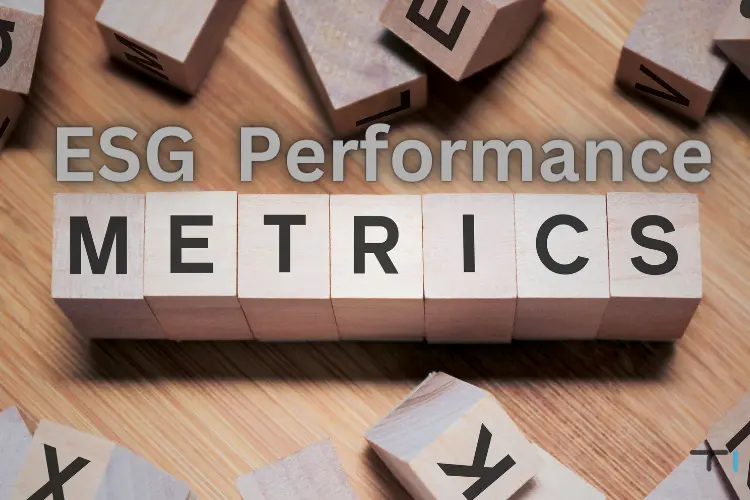
Monitoring and measuring ESG performance is vital for continuous improvement. Key Metrics for Tracking ESG Performance
- Carbon Emissions Reduction: This metric measures how much we reduce carbon emissions. We’re discussing energy-efficient operations, renewable energy adoption, and carbon offset programs. Our CRM systems can track and report on our progress toward our carbon reduction goals. So, not only are we saving the planet, but we’re also showing off our environmental chops.
- Diversity and Inclusion Index: This metric evaluates an organization’s level of diversity and inclusion. CRM systems can track all these super-important diversity indicators, like the percentage of women and underrepresented minorities in leadership roles and the implementation of inclusive hiring practices. This metric shows a company’s commitment to social responsibility and equal opportunities.
- Ethical Governance Score: An ethical governance score is like the judge and jury of a company’s ethical practices. It’s all about transparency, following the rules, and playing nice in the business sandbox. CRM systems can be the detective that helps track and monitor all this governance stuff, ensuring companies stay straight and narrow. Because let’s face it, nobody wants to be known as the company that plays fast and loose with the rules.
- Customer Satisfaction with Sustainable Practices: This metric measures customers’ happiness with a company’s sustainable and responsible business practices. CRM systems can gather feedback and sentiments from customers about sustainability efforts, helping businesses understand the impact of their ESG initiatives on customer relationships.
- Community Engagement Impact: This metric evaluates how awesome a company’s community engagement and social responsibility initiatives are. CRM systems can track and report on all the cool stuff a company does for the community, like outreach activities, donations, volunteer hours, and the overall impact on local communities.
When you integrate these metrics into CRM systems, they give businesses valuable insights into their ESG performance. It helps them make informed decisions, set strategic goals, and show off their commitment to sustainability and ethical practices.
Future Trends in CRM and ESG Integration

The future of CRM and ESG integration is looking pretty exciting! We’re discussing a landscape of innovation and sustainability with a dash of ethics and responsible business practices. It is the perfect blend of tech and conscience.
CRM systems are going next-level. They will use advanced analytics and artificial intelligence to give us deep insights into ESG performance. It’s like having a crystal ball for sustainable decision-making! These systems will seamlessly integrate with external ESG data sources and reporting frameworks. Compliance and transparency just got a whole lot easier.
Businesses are finally waking up to the importance of ESG and it is becoming a fundamental part of customer relationships and overall success. We’re talking about proactive ESG strategies embedded within CRM. It’s time to make sustainability the heart and soul of our business. The future is bright, sustainable, and oh-so-smart. Get ready to ride the wave of CRM and ESG integration!
Conclusion
To sum it up, integrating ESG (Environmental, Social, and Governance) principles into CRM (Customer Relationship Management) systems is a strategic necessity and a moral obligation for businesses today. As CEOs and managers of SaaS companies navigate the ever-changing landscape of responsible and sustainable business practices, it becomes clear that CRM platforms are more than just tools for customer engagement. They’re pretty crucial for driving ESG initiatives. The comprehensive guide we have here showcases the awesome impact that CRM can have on ESG goals. We’re discussing reducing carbon footprints, fostering inclusive workplaces, and promoting ethical governance. By leveraging CRM systems to align with ESG principles, businesses not only level up their relationships with customers but also positively contribute to the environment, society, and their long-term growth. The future of CRM is all about integrating technology and ethics harmoniously. It’s about being responsible, gaining a competitive edge, and committing to a better, more sustainable world.
